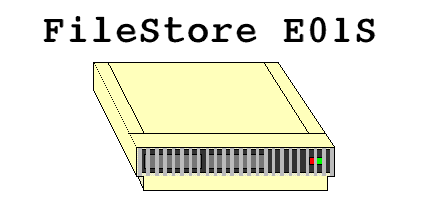

The FileStore is a development from earlier servers operating on a BBC microcomputer with a co-processor. It is a single-CPU design. You can find out more on the FileStore's hardware by clicking here.
Two versions of the FileStore exist. There is the original E01, then the later E01S. The difference is mainly a hardware issue, and is detailed in the hardware guide, or in table form in the Diff page. The "Stacking FileStore" is another name for the E01S.
The server supports the standard manager's interface for operation codes 0 to 32. It also
supports the standard set of *commands (*Delete, *Dir, *I am, *SDisc et cetera).
It also supports several management commands which are detailed below:
*NEWUSER <username>
Creates a user account for the specified username.
*PRIV <username> [S or L or none]
Sets the user privilege... System, Locked or Normal.
*REMUSER <username>
Removes the user account for the specified user.
*FSREPORT
Reports the FS state in a really cryptic way.
The error codes are explained here.
*PRNAME <printer name>
Sets the FileStore printer name (max 6 chars).
*PRPAGE [Y or N]
Sets printer form feeds on or off.
*FSFORMAT <drive> <disc name>
Format the specified FLOPPY DISC:
4 Left drive
5 Right drive
You need "FServFmt" (from the FS utilities
disc in order to format harddiscs).
*FSVERIFY <drive>
Verifies the specified drive.
*FSMAXDRIVE <maximum drive>
Sets the maximum drive. '3' disables floppies.
'5' enables all drives.
*FSMAXUSER <maximum user ID>
Sets the maximum number of users allowed to
log in.
*FSSTATION <station number>
Configures the FileServer station. This takes effect
immediately - and will probably crash your NetFS. :-)
*FSMODE [M or U]
M for maintenance mode, U to return to user mode.
When you return to user mode it is as if you just
switched the FileStore on.
*FSPROT [ON or OFF]
Sets whether or not the FileStore is 'protected'.
*FSUSER <id>
Used in maintenance mode to set the user ID that is
used to log in when the FileStore is turned on with
the drive door open (Maintenance mode 1). This is to
prevent a non-administrative user from starting the FS
up and formatting their own disc, etc, thus giving them
SYST access to the server.
[Thanks to Andrew Veitch for this information]
*FSNAMEDISC <drive> <disc name>
Renames the specified disc.
The configuration is stored in the onboard CMOS RAM. It is possible to view/edit CMOS directly by uploading a small piece of patchcode into the server. However it is recommended that you use the !FSutil program (part of the !BudgieMgr suite) because the editor routines have been rewritten and tested.
If you prefer to do things the hard way... then click here!